When Whole Foods Market made headlines in 2020When Whole Foods Market made headlines in 2020
The biggest chain of natural foods, owned by the biggest e-commerce company in the company, attracts the eyes of reporters, editors and analysts—and its competitors—every day.

Whole Foods Market, which was acquired by Amazon in 2017, dominates the natural food retail channel with 487 stores in the United States. So it's no surprise that the company regularly make headlines.
During 2020, though, many of those headlines were concerned with COVID-19 and what the company did or did not do to protect its employees and customers. Here's a roundup of some of the biggest Whole Foods news from last year.
March 16—Coronavirus and the resulting shopping surge delays Amazon orders
"We placed an order on Sunday using an Amazon Prime account, which will typically deliver purchases in one or two days. However, the service told us to expect our delivery on Thursday. In San Francisco, we also tried to buy a bag of chips on Amazon Fresh, which can bring you groceries in two hours. But the service showed us no delivery windows for the next three days."—Michael Kan, PCMag.com
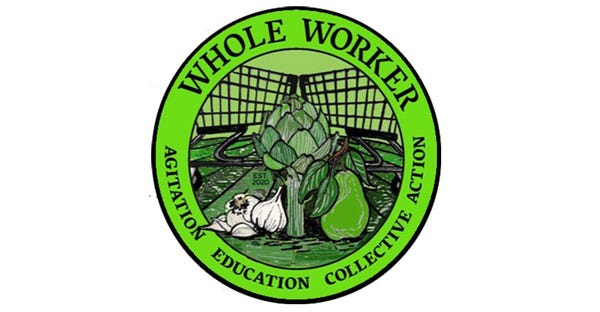
March 30—Whole Foods employees plan 'sick out'
Whole Worker, an organization of Whole Foods team members, petitioned their fellow workers to not work on March 31.
"Demands include guaranteed paid leave, reinstatement of health care for part-time and seasonal workers, hazard pay, and the immediate shut down of any Whole Foods location where a worker tests positive for COVID-19. 'Amazon and its subsidiary Whole Foods dared to keep open an Amazon warehouse and two Whole Foods stores where employees tested positive for COVID-19,' the group writes. 'We must prioritize the health of our workers over short-term financial gain.'" Whole Foods already provided employees diagnosed with COVID-19 or placed in quarantine two weeks' pay, and all employees unlimited unpaid time off and $2 per hour pay increases.—Eater
April 20—Whole Foods tracks employees to rank which stores might unionize
Using heat map tools, Whole Foods Market tracks and scores stores based on their risk of unionizing, anonymous sources told Business Insider. The metrics used to determine the risk include racial diversity, employee unity and violations of the Occupational Safety and Health Administration guidelines.—Business Insider

May 5—Philly Whole Foods criticized for lack of transparency after worker got COVID-19
Whole Foods notified employees on April 30 that an employee had tested positive for COVID-19, but rumors had been spreading for days. "The argument for letting people know as quickly as possible is because if they’re having to wait an extended period of time—before they know that they’ve been around someone who has tested positive—they actually could have been infectious during that time period themselves," said Krys Johnson, assistant professor of instruction in the department of epidemiology and biostatistics at Temple University.—Eater
May 29—Whole Foods receives top rating for plant-based food offering
Whole Foods Market and Kroger each received five stars from the Good Food Institute for their assortment, merchandising and marketing of plant-based meat, eggs and dairy products. The Institute rated 23 grocery chains in its analysis. “Top U.S. retailers are ensuring that all Americans have access to delicious and affordable plant-based meat, eggs and dairy,” GFI Executive Director Bruce Friedrich said in a statement.—Supermarket News
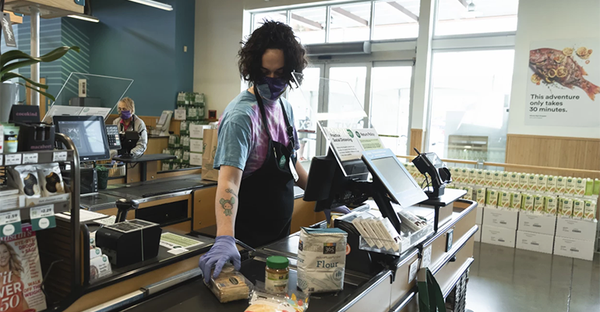
June 3—Whole Foods, Costco, Trader Joe’s lead in retailer COVID-19 safety
In its Consumer Health & Safety Index, Ipsos found that Whole Foods exhibited "near universal compliance" in facial coverings, with associates wearing face masks in 98% of the stores visited. In addition, Ipsos found 91% of stores carried out 6-foot social distancing boundaries in customer interactions; 95% had plexiglass barriers at checkout; and 87% enacted contactless payment.—Supermarket News
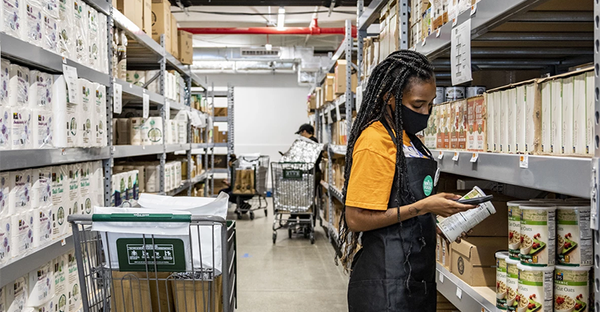
Sept. 2—Amazon opens the first permanent online-only Whole Foods store
"Earlier this year, Whole Foods temporarily converted a few of its locations into online-only stores to keep up with much higher grocery delivery demands...Its new location in Brooklyn isn’t just a temporary online-only store, though—it’s the first one the Amazon-owned supermarket chain built specifically to fulfill orders placed online."—Mariella Moon, associate editor, Engadge
Oct. 1—Amazon said nearly 20,000 workers got coronavirus
"If the rate among Amazon and Whole Foods Market employees were the same as it is for the general population rate, we estimate that we would have seen 33,952 cases among our workforce," Amazon said in a statement. "In reality, 19,816 employees have tested positive or been presumed positive for COVID-19 —42% lower than the expected number."—Eater
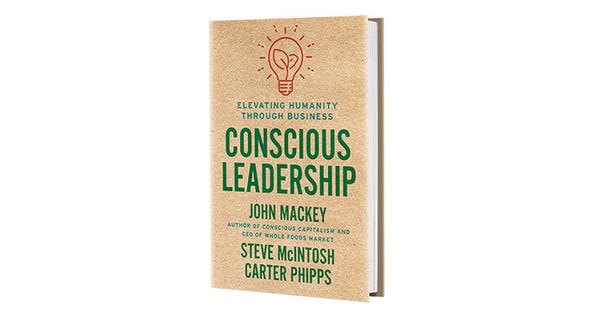
Oct. 5—Warren Buffett turned down the chance to buy Whole Foods
Whole Foods cofounder and CEO John Mackey says in his new book, Conscious Leadership, that company executives approached Warren Buffet in 2017 about buying Whole Foods. "He responded that it wasn't a good fit for him." But now, because Berkshire owns a small stake in Amazon, Buffet has a piece of Whole Foods Market.—Business Insider
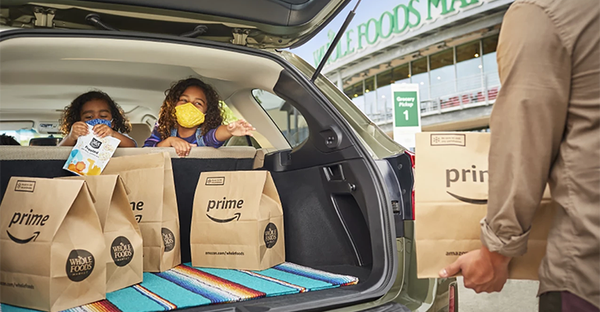
Oct. 21—Whole Foods Market launches free grocery pickup for Prime members
For Amazon Prime members, grocery orders that total $35 or more from Whole Foods Market can be picked up in one hour without a service charge. "[Amazon] said more than 40% of Whole Foods' monthly pickup orders come from customers trying the service for the first time and, according to recent findings from Global Data Research, nearly 68% of consumers plan to keep using curbside pickup post-pandemic."—Supermarket News
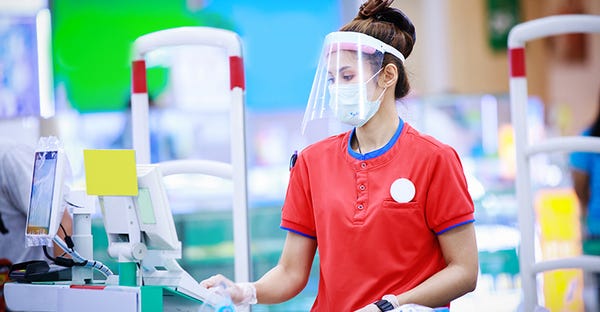
Nov. 4—The safest grocery store to shop during the pandemic
Whole Foods Market beat its competitors in Ipsos' September survey, just as it did in June, in several categories:
Having health and safety related signage
Store cleanliness
Compliance with employees wearing protective gear
Barriers to enforce distancing
Availability of sanitizing options
"In 76% of Whole Foods stores visited, mystery shoppers witnessed employees actively cleaning high-touch areas. That compared to an average of 59% across all grocery stores included in the survey."—Money Talks News
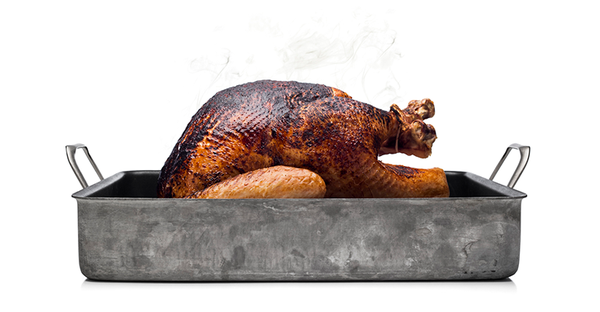
Nov. 10—Whole Foods, Progressive offer 'Thanksgiving Turkey Protection Plan'
Reportedly for the first time ever, consumers were offered insurance against a turkey disaster on Thanksgiving Day. Whole Foods Market and Progressive Insurance introduces the "first-ever 'insurance' for the beloved centerpiece of the Thanksgiving meal," USA Today reports. Consumers who burned, undercooked, overcooked or triggered any other "turkey fail" on Thanksgiving Day or Black Friday—and submitted one of the first 1,000 claims—received a $35 Whole Foods gift card.—USA Today
Dec. 17—Whole Foods employee calls for hazard pay, health benefits to be reinstated
Via email, an employee asked that Whole Foods reinstate hazard pay, health benefits for part-time employees and reinstating the previous dress code, which was changed on Nov. 2. The employee also wants Whole Foods to require that customers wear face masks or face shields. The email was published by Whole Worker, an organization of Whole Foods Market employees. — Business Insider
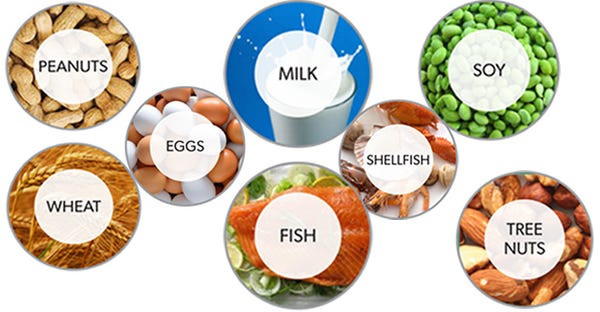
Dec. 23—FDA warns Whole Foods over products with undeclared food allergens
The U.S. Food and Drug Administration warned Whole Foods Market that it has established a pattern of selling private-label products that do not list major food allergens in their ingredients. Whole Foods recalled 32 products between October 2019 and November for this reason, according to the FDA. — Supermarket News
Dec. 24—Whole Foods Market workers sound alarm again on COVID-19 precautions in Pearl District
"Alexander Collias, a customer service team member at the Pearl District Whole Foods, worried that the COVID-19 diagnosis of a co-worker near Thanksgiving may have been related to the use of the plexi-glass barriers in place of actual physical distance. He’s chosen to get tested for the virus multiple times, paying out of pocket…The relaxed attendance policy and the hazard pay granted to him and co-workers during the start of the pandemic helped create a better sense of security for those working with the public. But as those policies fizzled in the summer, frustrations began to simmer and cases started to soar." — Street Roots
About the Author
You May Also Like





